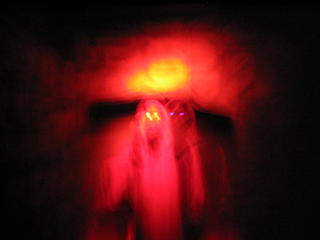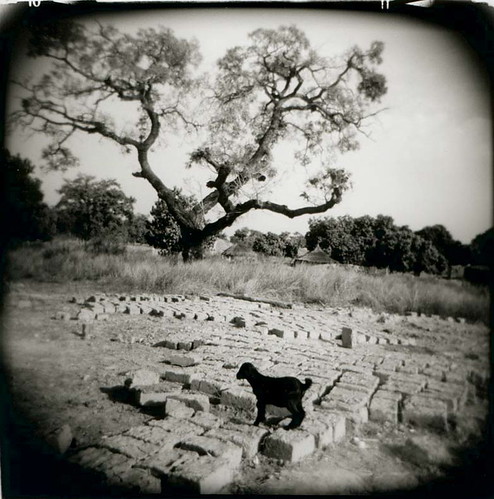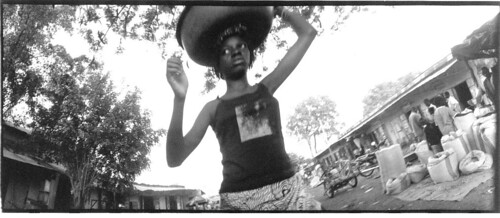
In all the time I knew him, I saw my grandfather in two primary costumes: his pajamas/bathrobe and a business suit. He wore his pajamas every morning while making us bacon and eggs, his leather slippers softshoeing on the oft-sand scattered linoleum. The kitchen faced east; sun broke through a huge magnolia in the side yard. This was in Hampton, Virginia, located where the James RIver empties into the Chesapeake. Every day en route to my cousins' house on Chseapeake Avenue we'd pass the historical marker describing the battle of the Monitor and the Merrimac, which took place right there in front of my cousins' house. After making breakfast my grandfather, who we called Big Daddy--emphasis on the "Big" and not the more pimp-like "Daddy"-- would take a shower and put on his suit, always wearing a hat and overcoat, say goodbye to everyone and walk to a door in the upstairs apartment my mom and her brother mostly grew up in, open the door and walk down a flight of steps to his office, which was on the first floor. He owned and ran a funeral home, all of which lay below the apartment. Cousin Bryan taught me how to play Super Freak on the chapel organ. I'd seen more dead bodies by the time I was 7 then most Americans who have no tbeen to war see in a lifetime. Adults tried to hide it from us but kids are curious. One body still haunts me, a fat woman, completely naked, in the white-tiled lab, the embalmer looking up from the gray body.
I don't mean to start off my first address to the interweb in months so morbidly. I don't have death on my mind any more than you should, which is to say, constantly. Anyhow, I was spooled back through time in a very pleasant way as a result of this interview with David Berman. My grandfather, who died in 1985, my freshman year at college, was an extraordinary man who I think about every day, literally. I couldn't go to the funeral because of ice storms acros the South. I've never felt guilt, if you wondered.
I met Berman for the first time sometime in the early to late mid90s, in Charlottesville, when he and Will were first getting together to plan out the Silver Palace record...actually, I think they were prepared to record, as I have a very dim recollection of guitars and mics, maybe even a DAT, a mixing board, a stool on an oriental rug. Tea bags. Maybe they did make some songs. Chris and I had driven out rte 20 to Berman's rented place, Will and Paul were there, and a friend or two. Will and DIanne were responsible for supper; it was a baked rice dish that I've eaten with the Oldhams before, maybe a family recipe, grandmother perhaps, where you bake the raw rice in liquid and vegetables. There was a big bottle of jug wine, some beers. It was summertime so the woods around crowded you even when you weren't near to them; insects creeched from the swollen greenery. We watched the Heidi Fleiss documentary. Berman was arguing with Paul, challenging him to defend Can, who Berman loathed. Paul was using the Henry Jamesian mechanism of "I like Can; that is enough", but Berman was having none of it. Hectoring--where does that word come from? Wasn't the Iliad's Hector the only honorable guy in the whole war?--anyway, hectoring comes to mind. We were all younger then, but Paul most so, and Berman is a tall cat with a good loud voice that comes out of his mouth with a directness and an absolute lack of confusion that I've always admired...Paul, having grown up with Ned and Will, had long ago learned to defend himself but at the same time you could tell that having someone yelling at him about Can, forcing him into the position of explaining why he liked Can was jarring, used perhaps to more intensely quiet lines of questioning--Defend them, Paul! Berman yelled. Why on earth would you like such a shitty, pointless band? Explain it, please. I'm still waiting for someone to explain to me why this band is so great, and you're not doing a very good job of it, either.
Since then Berman's always occupied a part of my mind that I don't always want him occupying. We are friends in a distant but tangible way in such a way as you might be friends with twenty people; there's that sense that you know someone well enough, but not too well. He did not answer any of my emails for a year after I made passing reference to the Ravens' beating of the Titans in the AFC championship a few yrs ago, nevermind that I entirely agreed with his negative assessment of the Billick-led Ravens, and I even think that in the Pitchfork interview he subconsciously utilized the word I used to describe the Ravens so many years ago, which was "unlikable". He pestered me to send him a copy of my languishing Mali book so I, at great expense, made a copy of the thing and took it to him in Nashville when I did a few tiny things on the Best of Palace record last winter. When I asked him a few weeks later if he'd read it he yelled at me in an email, accusing me of being an asshole for "dropping such a huge book in his lap". I suppose this was at the height--or the depths--of the lifestyle abuse referred to in the Pitchfork interview.
Even so, there's a very short list of people whose modes of navigating life seem unique and admirable to me, and whose work seems to reflect some distilled essence of their lives rather than an ironic put-on or "art exercise", and Berman is one of those people. Perhaps the line between "ironic put-on" and "distilled essence" is remarkably thin, so thin as to be invisible. Who's to say one can't create the illusion of "distilled essence" as I suppose Ryan Adams, Sons of Leon, the Magnolia Electric guy, and Jay Farrar attempt to do?
Many might accuse Bonny Prince Billy of art-school artifice, of too rigorous an application of intellectual concepts of identity to his music-making, but anyone with an even remotely objective take on what Will's been doing for the past 15 years knows that the opposite is true. There's a corny stereotype about the great artist being physically unable to do anything but exactly what they're doing--the assumption that the great artist is unable to make the compromises that you and I make hourly in obeisance to the life of the consumer gods --but in the case of both Will and Berman I believe this to be true. Then there's that notion that people occupy their place in contemporary mythology not due to any effort on their part but because unknowable conditions and forces have eddied them to where they are, sort of dropped them off in some tidal pool not of their choosing. Maybe this is it more than ambition or desire. Who knows. Oldham and Berman. I could see both of them being lawyers but certainly not antique store owners, or label magnates. It's not even an issue of purity, a moral concept I think both Jew and Catholic alike would take issue with, but instead limitations and an ability to focus energies (at least in Will's case). I'm not saying this any better or more honorable than what you and I do, for as we all know the line between stupidity and solipsism and selfishness and childishness is all one, and choosing instead to settle in to Cohen's House of Mystery, like Sam Gamgee at the end of Return of the King, as anyone who's done it knows, is the wildest, weirdest, hardest adventure there is, infinitely more difficult than being by yourself and like a little lost boy leaving everything behind every few years...
In the early 90s a friend worked at the Museum of the Confederacy in Richmond. One morning before opening--it was early, just past dawn--my friend, broom in hand, was interrupted by a banging on the door. A man stood there, hooded in a grey sweatshrt and matching grey sweatpants. A skinny woman with long red hair that sprung out from her head in a sticky halo not unlike cotton candy stood impatiently behind the man sucking intently on a cigarette. He wore white Chuck Taylor hightops which my friend noted appeared brand new, glowing there in the dawn; also, interestingly, the man, for even though the creature was slight of frame is was clearly a man, the way it bounced on its toes as it stood on the other side of the plate glass, had a white towel draped around his neck, on the outside of his sweatshirt. The woman finished one cigarette and lit another.
The museum had had a problem with homeless loiterers using the bathroom. My friend yelled at the guy, threatened to call the cops, told him then politely, embarrassed, maybe considering that the guy might in fact be a visitor, that they opened at 9. THe figure nodded and began to shadow box. The woman shook her hair; her mascara began to drip; she stubbed out her cigarette.
After a half hour or so the guy banged on the door again. My friend approached the door with nothing like anger but wanting instead to settle the man's impatience, to prove to the man and woman that they'd have to wait until opening. But then he knew he would open the door, because the man was Bob Dylan and he, my friend, already had tickets to the night's show at the Mosque. Dylan asked for the lyrics to Dixie; my friend gave him the lyrics from a faded folder and gave him a tour of the museum.
That night Dylan opened the show with Dixie but he did not sing the lyrics.
A number of years ago we played some shows in California with a band called the Supreme Dicks . They'd gone to Hampshire College at the height of the 80s hippy revival and said they'd come up with the most obnoxious name possible mostly in order to tweak dorky earnest hippie sensibilities of their liberal Yankee counterparts. One of the Supreme Dicks looked familiar to all of us. (Another guy in the band was perhaps apocryphally the source of Buck in Chuck and Buck ). We grew to like the Dicks quite a lot. Sweeney played drums for them. I've already mentioned that in LA Sweeney knew somebody who invited us over for a swim. So we drive up into the Hills to a producer's house. A starlet was there, pretty but with bad skin, and Adam Goldberg , who sat poolside reading a gigantic tome made out of pressed leather whose pages were yellowed and crumbling. So intent was he to figure out the book he did not look at us as we all striped down to our bathing suits. This is where I saw Sweeney try to jump off the diving board; Liz Bougatsos of Gang Gang Dance was there--she was the road manager for the tour--and this is also where Ned splashed Goldberg with the cannonball (in retelling this story, now referred to twice in this account of things now and past, to someone who knows Goldberg, I have learned that what I understood to be arrogance was instead nerves; AG was a big fan of Will's...the tailor re-tailored).
There's no reason to pretend that the upcoming exposure of the familiar Dick--Sam Dylan, son of Bob and Sara, brother to Jakob and Jessie, the guy who directed Kicking and Screaming and How High-- might hold any import whatsoever, but as Berman claims in his interview, it's often more important to be a witness rather than the witnessed; these little nodes of information are recorded in public places and the public translates them as they will...on the same tour we ate Indian food with Phil Ochs' daughter and watched Cher's son play a video game that involved maneuvering a skateboarder through a cityscape.
PS: I'd totally forgotten about that nut-job who followed the Dicks up the whole West Coast dancing and gyrating. Apparently he's the Kapelovitz who started the page. Any clarification on the issue would be appreciated.

